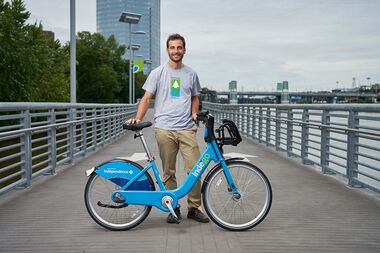Get to know the Greenway: Daniel Paschall

Photo: Matt DeBruycker
By Jessica Reid, Communications Intern
With a focus on equitable access to the East Coast Greenway in his region, Mid-Atlantic Coordinator Daniel Paschall plans and advocates for trails in Pennsylvania, Delaware, Maryland and Washington, D.C.
He says the core of his work is figuring out how to learn from and elevate the communities around the greenways. Paschall’s work involves talking with people and understanding their needs. He said the Greenway should be “incredibly intentional” about meeting the needs of local residents, as expressed by those local residents, rather than simply relying on planners and good intentions.
Living and working in a densely populated region, the Philadelphia-based Paschall strives to expand trails and greenways despite heavy traffic and often-sprawling development.
Paschall also works with legislators and has gained support from Delaware Senators Chris Coons and Tom Carper for Greenway Stimulus, which calls for significant federal infrastructure investment in greenway and trail connectivity and has been supported by more than 150 organizations from around the country.
Recently, Paschall helped create an inclusionary trail planning toolkit for a project commissioned by the Pennsylvania Environmental Council. The toolkit has guided his work to focus on equity when building the Greenway.
As the Greenway grows and links trails in Philadelphia, “a big concern is gentrification and displacement because of rising property values,” said Paschall. “On the one side, we definitely want to see trails increase the value of the community that they go through, but we don't want the residents of that community to not get to experience that value because they can no longer afford to live there.”
Improving equity requires education, genuine relationship-building and sustained effort. Paschall continued, “We need to learn the real consequences of what systemic racism has caused in these communities. That means it's going to take a long time, but it also means that there's power in the immediate actions that we can take along that way, and a big part of that is listening and showing up. So the inclusionary trail planning toolkit is very much about being there in person, going to the community without an agenda and trying to just sit in on their meetings that are open to the public and learn what they're going through.”
Planning for trails is complex, but the benefits are vast. Paschall said planners should think about how trails are “an instrument for dismantling the oppressive parts of the system, or the whole system itself, to build up access to health care, access to schools, and access to recreation and outdoor space, [which has] mental health and physical health benefits that study after study have shown.”
Paschall grew up in the foothills of the Appalachian Mountains in northern Virginia, between a rural and suburban area. He was concerned that “the gorgeous scenery that's around there was quickly gobbled up and turned into strip malls.” Witnessing this environmental change made him want to fight climate change, so he majored in environmental engineering at Northwestern University. He realized he preferred the social aspects of environmental work, so he earned a master’s degree in city and regional planning from Pratt Institute’s Graduate Center for Planning and the Environment.
Now at the Greenway, he said, “The job has forced me to look at inclusion at different scales, which I've really appreciated.”
His favorite segment of the Greenway is the Jack A. Markell Trail in Delaware because of its beautiful tunnel of vegetation. He appreciates Cobbs Creek Trail in Philadelphia because it has recently received more attention and maintenance, so it is encouraging more people to get outside and use trails. He also likes the Metropolitan Branch Trail in Washington, D.C., because it provides easy access to active transportation and connects to an amazing bike shop and nonprofit, Gearin’ Up Bicycles, which provides job training to local youth from underserved communities.
In his free time, Paschall loves to walk through the streets of Philadelphia to photograph the architecture and witness the diverse culture of the city.
Join the Greenway family
Receive East Coast Greenway news directly in your inbox.
Together, let's grow the Greenway
Recent record-setting funding for design and construction goes directly to building the East Coast Greenway - as it should. The East Coast Greenway Alliance needs your support to continue our advocacy work that is fueling completion of the Greenway. The Alliance has a sustained track record of turning every dollar donated to our nonprofit into $100 in public infrastructure investment. Invest today and support the growth of the East Coast Greenway from Maine to Florida.